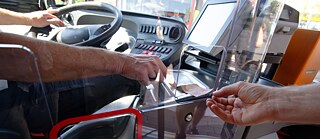Frankly ... integrated
Aren’t we all for sale?

While reliving his first encounter with corruption in Germany, author Dominic Otiang’a questions why people turn out to be like that - in Kenya and in Germany. Are we all the same and it’s just a question of opportunity?
By Dominic Otiang’a
At the beginning of the pandemic, the impression that some countries were more prepared to deal with it than others was ubiquitous. However, as time passed, the similarities between countries and their leaders kept growing – from Covid deniers to Covid-related corruption scandals.
I had been socialised to believe that acts of corruption are committed by the poorly paid individuals who seek to complement their worthless salaries. That influenced my biased judgement of a rich state like Germany, in which I did not even expect theft. Not until my nephew’s bicycle was whisked off the school grounds near Hanover. First, I was shocked about it, because I didn’t expect such an act in a rich country, then I was annoyed by the fact that I was shocked. It dawned on me that in order to understand this “new” society, first I had to not just accept, but deeply internalise that human beings are the same everywhere. That way, whenever I had an unexpected experience, I would begin to ask “why” rather than follow the mantra “when in Rome do as the Romans do”.
The 30 cents difference
Familiar situations in a foreign environment sometimes appear different. Yet, in one of my articles, I stated that the longer I stayed in Germany, the more things became similar to my earlier experiences in Kenya. I also mentioned my first unexpected encounter with corruption in Germany: I had just boarded a bus for a short distance, presented the exact fare of 1.30 € and waited for the driver to pull up a receipt for me. He pushed the 30 cents to my side, kept the one euro and remained calm, preparing to drive on. He then asked me to find a seat. I said I was still waiting for the receipt. He turned towards me, eyes wide and asked for the 30 cents, inserted the coins in the machine and punched some numbers on the keypad before pulling out the receipt and passing it to me over his shoulder. By the time I understood that this man had been trying to share the “public loot” with me, I was outside the bus.Day-to-day corruption
Later on, I shared the story of that encounter with some friends and none claimed to have experienced anything like that. It could be true that some people take or solicit a bribe to boost their income and to have access to basic needs, but I didn’t see that in this situation, in which one euro was the amount to be accounted for. I think corruption has got a lot to do with greed, but I couldn’t see it either. The bus driver, so it seemed, had simply been socialised differently in an environment full of day-to-day corruption. But since I have been convinced that people are the same everywhere, I still wanted to understand why I hardly see such kind of corruption around me, and why some countries are said to be more corrupt than others.My dictionary describes corruption as “an act done with an intent to give some advantage inconsistent with official duty and the rights of others”. I had talked before about how cultures and ways of life have been shaped by the means to have “bread and butter”. Well, I am lucky to experience living in two different economic systems: in Kenya and Germany. In Germany, citizens are mostly employees.
Only 9.3 percent are self-employed according to the Institute for SME Research Bonn (Institut für Mittelstandsforschung Bonn). In Kenya, people are mostly self-employed: 51.31 percent according to 2020 projections by the World Bank as reported by Trading Economics. I noticed that in both countries suspects of corruption are most likely people who have the power to make transactions or financial decisions, which affect their own income or that of a group, a business or a country. In rare cases low-level employees are involved.
For Kenya, the Teachers Service Commission (TSC) is one of the biggest employers and reportedly one of the least corrupt. Both countries have had their fair share of corruption scandals involving medical masks in context of the COVID-19 pandemic with politicians as main suspects.
But does it mean that all employees are righteous and incorruptible and that only self-employed people can be corrupted? And can you claim to be incorruptible if you are not in a position of responsibility and cannot influence transactions? Well, there’s a test for that: Look around in your house, and if you have diverted anything that was meant for a group, from work, an organisation or a company, for your personal gain, be it a pen or printing materials, there is some potential for corruption in you.
“Frankly ...”
On an alternating basis each week, our “Frankly …” column series is written by Dominic Otiang’a, Aya Jaff, Maximilian Buddenbohm and Margarita Tsomou. Dominic Otiang'a writes about his life in Germany: what strikes him, what is strange, where did he get interesting insights?